
The Genetic Resources Research Institute (GeRRI), also known as the National Gene Bank, has joined forces with sorghum farmers to revitalize production and consumption of this crucial food security crop in Western Kenya. Despite being an essential staple, sorghum’s production has faced neglect, prompting GeRRI to spearhead the Seeds for Resilience Project, a collaborative effort funded by the German government and coordinated by the Crop Trust.
Unlocking the Potential of Sorghum Varieties
GeRRI, a semi-autonomous institute under the Kenya Agricultural and Livestock Research Organisation (KALRO), conserves a vast array of sorghum accessions from various countries. The challenge lies in bridging the gap between these valuable varieties and the farmers who can benefit from them. Through the Seeds for Resilience Project, GeRRI is actively engaging with farmers to explore how these sorghum varieties can combat climate change and enhance food security.
The project provides farmers with the opportunity to select preferred sorghum varieties based on their criteria, fostering a sense of ownership and collaboration in the fight against climate change. Last season, GeRRI distributed seeds of 51 different sorghum ecotypes to 511 farmers in Busia and Siaya counties, ensuring access to varieties that may have been lost over time.
Empowering Farmers Through Knowledge
Dr. Peterson Wambugu, a Principal Research Scientist at GeRRI, emphasized the importance of supporting farming communities in conducting farmer-managed trials. This approach enables farmers to select varieties tailored to their growing conditions, preferences, and resilience to climate change.
“Gene banks are broadening the choice of varieties that farmers have for fighting climate change by giving each farmer three varieties for testing on their farms,” explained Dr. Wambugu.
A Diverse Approach for Food Security
Scientists underscore the importance of growing different crops and varieties to secure food in the face of climate change. GeRRI’s feedback meetings with farmers revealed diverse experiences, from successful yields to challenges such as bird attacks.
Boniface Omenda, a farmer from Nasuna, Bundalangi, shared, “All my three varieties germinated well, although ‘A’ took long to mature, it yielded the best, ‘B’ was fast maturing and better yielding than ‘C’ which was highly attacked by birds.”
Cultivating Community Seed Banks for Sustainability
GeRRI Institute Director Dr. Desterio Nyamongo urged farmers to multiply and share their preferred varieties within villages. This approach aims to break dependence on commercially sourced seeds and create resilient, locally adapted seeds.
To address bird attacks, Dr. Nyamongo advised farmers to plant susceptible varieties late, as birds tend to feed on the earliest matured crops. Additionally, the concept of community seed banks has sparked interest among farmers, ensuring disciplined seed saving, multiplication, and preservation.
A Call to Action for a Sustainable Future
In closing, Dr. Nyamongo encouraged farmers not only to regain lost varieties but also to safeguard them by multiplying and sharing within their communities. The Seeds for Resilience Project is sowing the seeds for a climate-resilient future, where local farmers play a pivotal role in ensuring food security, sustainability, and community empowerment.
Stay updated with the latest farming tips and agriculture industry news from Africa by subscribing to our newsletter. Don’t miss out on valuable insights and updates. Follow us on Twitter, LinkedIn, and Facebook to join our farming community and stay connected with us.



















